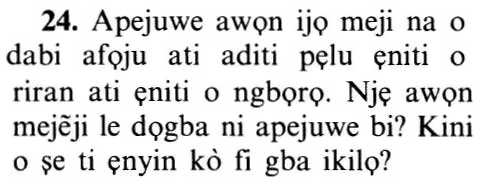11vs24
Select any filter and click on Go! to see results
Yoruba Translation

Hausa Translation
Misãlin ɓangaren biyu kamar makãho ne da kurmã, da mai gani da mai ji. Shin, sunã daidaita ga misãli? Ashe, bã ku yin tunãni?
Asbabu n-Nuzuul (Occasions of Revelation)
The Parable of the Believers and the Disbelievers
Then, Allah, the Exalted, makes a parable of the disbelievers and the believers.
He says,
مَثَلُ الْفَرِيقَيْنِ ...
The likeness of the two parties,
This refers to those disbelievers whom Allah first described as wretched, and then those believers whom He described with delightfulness.
... كَالأَعْمَى وَالأَصَمِّ وَالْبَصِيرِ وَالسَّمِيعِ ...
The likeness of the two parties is as the blind and the deaf and the seer and the hearer.
The first group is like one who is blind and deaf, while the second group is like he who sees and hears.
Thus, the disbeliever is blind from the truth in this life and in the Hereafter. He is not guided to goodness, nor does he recognize it. He is deaf from hearing the proofs, thus he does not hear that which would benefit him.
As Allah says,
وَلَوْ عَلِمَ اللَّهُ فِيهِمْ خَيْرًا لأَسْمَعَهُمْ
Had Allah known of any good in them, He would indeed have made them listen. (8:23)
The believer is smart, bright and clever. He sees the truth and distinguishes between the truth and falsehood. Thus, he follows the good and abandons the evil. He hears and distinguishes between the proof and scepticism. Therefore, falsehood does not overcome him.
... هَلْ يَسْتَوِيَانِ مَثَلاً ...
Are they equal when compared!
ie are these two types of people alike!
... أَفَلاَ تَذَكَّرُونَ ﴿٢٤﴾
Will you not then take heed!
This statement means, "Will you not consider, so that you may distinguish between these two categories of people.''
This is as Allah mentions in another verse,
لاَ يَسْتَوِى أَصْحَـبُ النَّارِ وَأَصْحَـبُ الْجَنَّةِ أَصْحَـبُ الْجَنَّةِ هُمُ الْفَآئِزُونَ
Not equal are the dwellers of the Fire and the dwellers of the Paradise. It is the dwellers of Paradise that will be successful. (59:20)
Allah also says,
وَمَا يَسْتَوِى الاٌّعْمَى وَالْبَصِيرُ
وَلاَ الظُّلُمَاتُ وَلاَ النُّورُ
وَلاَ الظِّلُّ وَلاَ الْحَرُورُ
وَمَا يَسْتَوِى الاٌّحْيَآءُ وَلاَ الاٌّمْوَاتُ إِنَّ اللَّهَ يُسْمِعُ مَن يَشَآءُ وَمَآ أَنتَ بِمُسْمِعٍ مَّن فِى الْقُبُورِ
إِنْ أَنتَ إِلاَّ نَذِيرٌ
إِنَّآ أَرْسَلْنَـكَ بِالْحَقِّ بَشِيراً وَنَذِيراً وَإِن مِّنْ أُمَّةٍ إِلاَّ خَلاَ فِيهَا نَذِيرٌ
Not alike are the blind and the seeing. Nor are (alike) darkness and light. Nor are (alike) the shade and the sun's heat. Nor are (alike) the living and the dead.
Verily, Allah makes whom He wills to hear, but you cannot make hear those who are in graves. You are only a warner.
Verily, We have sent you with the truth, a bearer of glad tidings and a warner. And there never was a nation but a warner had passed among them. (35:19-24)
فقال " مثل الفريقين " أي الذين وصفهم أولا بالشقاء والمؤمنين بالسعادة فأولئك كالأعمى والأصم وهؤلاء كالبصير والسميع فالكافر أعمى عن وجه الحق في الدنيا والآخرة لا يهتدي إلى خير ولا يعرفه أصم عن سماع الحجج فلا يسمع ما ينتفع به " ولو علم الله فيهم خيرا لأسمعهم " الآية وأما المؤمن ففطن ذكي لبيب بصير بالحق يميز بينه وبين الباطل فيتبع الخير ويترك الشر سميع للحجة يفرق بينها وبين الشبهة فلا يروج عليه باطل فهل يستوي هذا وهذا ؟ " أفلا تذكرون " أفلا تعتبرون فتفرقون بين هؤلاء وهؤلاء كما قال في الآية الأخرى " لا يستوي أصحاب النار وأصحاب الجنة أصحاب الجنة هم الفائزون " وكقوله " وما يستوي الأعمى والبصير ولا الظلمات ولا النور ولا الظل ولا الحرور وما يستوي الأحياء ولا الأموات إن الله يسمع من يشاء وما أنت بمسمع من في القبور إن أنت إلا نذير إنا أرسلناك بالحق بشيرا ونذيرا وإن من أمة إلا خلا فيها نذير " .
"مثل" صفة "الفريقين" الكفار والمؤمنين "كالأعمى والأصم" هذا مثل الكافر "والبصير والسميع" هذا مثل المؤمن "هل يستويان مثلا" لا "أفلا تذكرون" فيه إدغام التاء في الأصل في الذال تتعظون
" مثل الفريقين " ابتداء , والخبر " كالأعمى " وما بعده . قال الأخفش : أي كمثل الأعمى . النحاس : التقدير مثل فريق الكافر كالأعمى والأصم , ومثل فريق المؤمن كالسميع والبصير ; ولهذا قال : " هل يستويان " فرد إلى الفريقين وهما اثنان روي معناه عن قتادة وغيره . قال الضحاك : الأعمى والأصم مثل للكافر , والسميع والبصير مثل للمؤمن . وقيل : المعنى هل يستوي الأعمى والبصير , وهل يستوي الأصم والسميع . " مثلا " منصوب على التمييز . " أفلا تذكرون " في الوصفين وتنظرون .
I'raab - grammatical analysis of the Qur'an
«مَثَلُ» مبتدأ.
«الْفَرِيقَيْنِ» مضاف إليه مجرور بالياء لأنه مثنى.
«كَالْأَعْمى » متعلقان بالخبر المحذوف.
«وَالْأَصَمِّ» معطوف على الأعمى.
«وَالْبَصِيرِ وَالسَّمِيعِ» عطف على ما سبق.
«هَلْ» حرف استفهام.
«يَسْتَوِيانِ» مضارع مرفوع بثبوت النون والواو فاعل والجملة مستأنفة.
«أَفَلا» الهمزة للاستفهام والفاء استئنافية ولا نافية.
«تَذَكَّرُونَ» مضارع مرفوع والواو فاعل والجملة مستأنفة.
